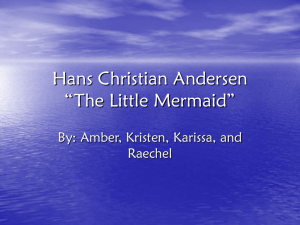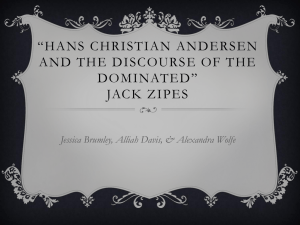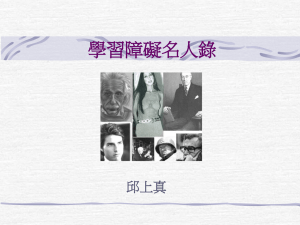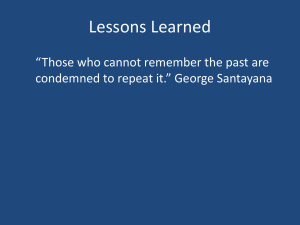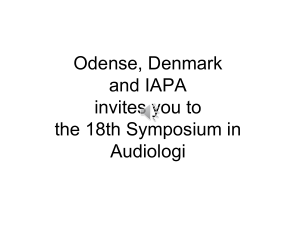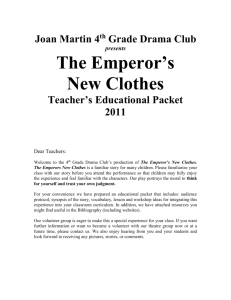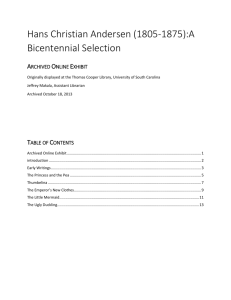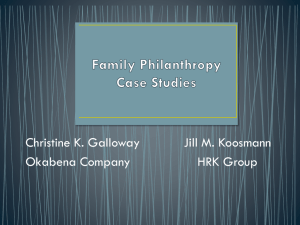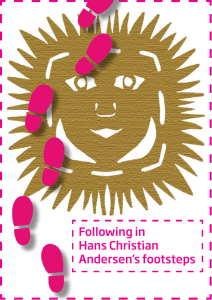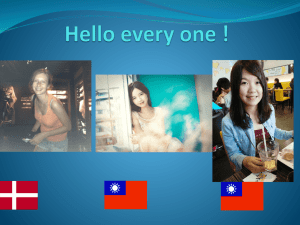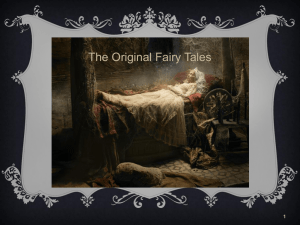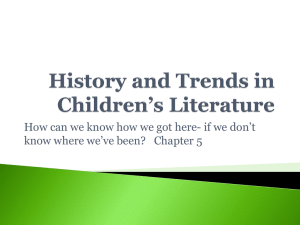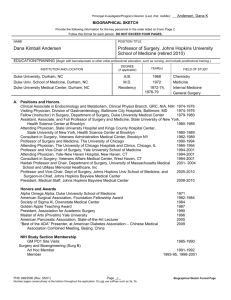Hans Christian Andersen - Tracy Richter`s School Library Media
advertisement
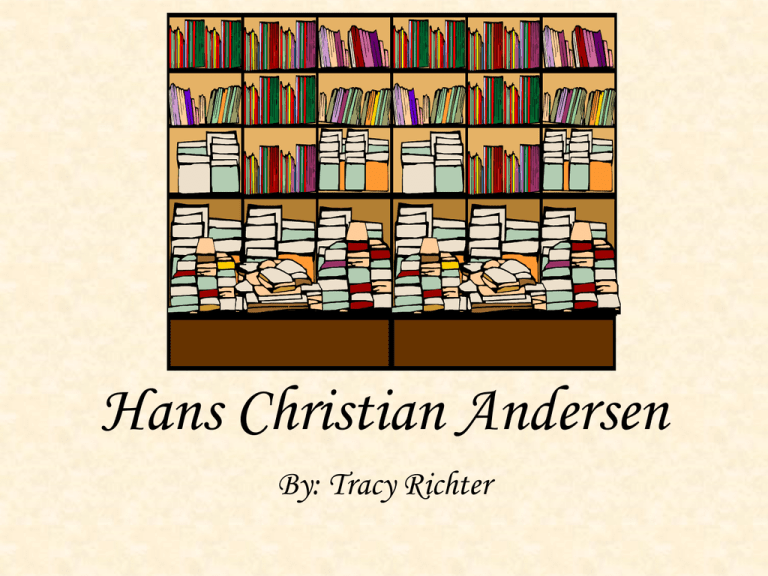
Hans Christian Andersen By: Tracy Richter The Life of Hans Christian Andersen • Born on April 2nd, 1805 in Odense, Denmark. • His family was very poor: his father was a shoemaker and his mother was a washerwoman. • In 1819, at age 14, he moved to Copenhagen to seek fortune on the stage but failed. • The King Fredrick VI was interested in him and sent him to Slagelse Grammar School in 1822 for free. • He hated school because he was constantly mocked by his classmates and his teachers. http://iguide.travel/Odense/Introduction#/Gallery • In 1827, he attended University of Copenhagen and writes his first poem, called “The Dying Child,” which was published in the Copenhagen Post. • He published his first book, The Improvisatore, in 1835 and in that same year he published his first set fairy tales, Tales Told for Children. • His fairy tales did not become popular until 1842. • Wrote 168 tales, in addition to many other writings. • He died from liver cancer on August 4th, 1875. cipshare.com Interesting Facts • He loved to travel and wrote many travel guides about his journeys. • He fell in love with Jenny Lind, a famous opera singer, but he never married. • A number of his tales were published in America even before being published in his native Denmark. • He became friends with Charles Dickens and stayed with him for a time in London. • He liked to make paper cuttings. One of his paper cuttings appeared on a Danish stamp to commemorate his 200th birthday. Swedishnightingale.com • Memorial for Hans Christian Andersen located in Central Park, NY. It cost $75,000 which was contributed by the Danish and American schoolchildren and by the DanishAmerican Women's Association to commemorate the 150th anniversary of Andersen's birth. He is big enough to climb on and during the summer months they have a storytelling program there. Characteristics of Writing • His writing style was very unique at the time. • The use of idiom, irony and humor, memorable characters, and moral teachings in his tales were inspired by the folktales he heard as a child. • Instead of retelling old stories, like many did at that time, he created his own tales. • Many of his tales end unhappily, but that made them authentic. • Includes lots of details for the adult reader to enjoy as well. Quotes “Every man's life is a fairy tale written by God's fingers.” notablebiographies.com “Enjoy life. There's plenty of time to be dead.” Awards • The King of Denmark awarded him an monetary grant in 1833 for his travels. • In 1846, he received the Knighthood of the Red Eagle from King Friedrich Wilhelm IV of Prussia. • In 1851 he was appointed titular professor in Copenhagen. • In 1859, he received the Maximilian Order of Art and Science from King Maximilian II of Bavaria. • 1867 he was awarded the Freedom of the City of Odense. • 1874 becomes a Privy Councillor for Copenhagen. Awards The Hans Christian Andersen Award is given out by IBBY every other year to a living author and illustrator whose complete works have made a lasting contribution to children’s literature. It is the highest international award given to an author and an illustrator. Some of the USA winners include: 1970 Maurice Sendak (Illustrator) 1998 Katherine Patterson (Author) Selected Works He wrote 168 tales, some of his most popular tales include: “The Emperor’s New Clothes” “Thumbelina” “The Princess and the Pea” “The Steadfast Tin Soldier” “The Fir Tree” “The Little Mermaid” “The Nightingale” “The Little Match Girl” “The Ugly Duckling” “The Snow Queen” “The Tinder Box” Pixiepalace.com Pixiepalace.com All contained in: Totalsoundrecording.com Andersen, Christian Hans. Hans Christian Andersen: the Complete Fairy Tales and Stories. Trans. Erik C. Haugaard. New York: Anchor Books, 1983. Review of Book By:Eileen Hanning (Children's Literature) This pretty little book contains a traditional rendition of Andersen's tale. In the original story, the little mermaid wants to marry the prince to gain an immortal soul. When the little mermaid trades her voice for legs, the prince befriends her but marries someone else. The ending isn't as happy as the Disney version, but it is certainly nobler and thought provoking. Feminist readers may wince at language such as ". . . but everyone knows you have to suffer if you want to look nice . . ." and at the little mermaid's need for the prince's love to earn her immortal soul, but they should read on. In the end, the little mermaid is her own heroine, both saving the prince and winning the opportunity to earn a soul by herself. The language stays true to the oral origins of Andersen's work resulting in a great tale but challenging and sometimes archaic syntax and vocabulary. Even experienced young readers may need a little help with words such as sulphur, unfurled, and tempestuous. While sophisticated word choices and nearly fifty pages of text may discourage younger readers from reading it alone, this story truly shines when read aloud. Illustrations were done by a variety of Disney artists during the early conceptual phases of their production of The Little Mermaid and provide a fascinating glimpse at other ways Ariel and her story might have been depicted by Disney. 1997, Hyperion Books for Children, $11.95. Ages 6 to 12. http://search.barnesandnoble.com/books/prod uct.aspx?box=978-0786803835&pos=1&EAN=9780786803835 Helpful Websites • http://www.bl.uk/onlinegallery/features/andersen/learning.html (Fun and creative activities to encourage young people to engage with Andersen’s stories) • http://www.hca.eu/index.php?option=com_content&task=view&id=21 &Itemid=39 (Fun site with games, quizzes, his stories, and a brief biography of his life) • http://edsitement.neh.gov/view_lesson_plan.asp?id=417 (suggestions for Hans Christian Andersen lesson plans) Bibliography Hanning, Eileen. "The Little Mermaid." Rev. of The Little Mermaid. The Children's Literature Comprehensive Database. Web. 17 Oct. 2010. <http://clcd.odyssi.com.proxy-tu.researchport.umd.edu/cgibin/member/search/f?./temp/~6wYbDp:5>. "Hans Christian Andersen Awards." The International Board on Books for Young People. Web. 17 Oct. 2010. <http://www.ibby.org/index.php?id=273>. "Hans Christian Andersen." Online Gallery: Hans Christian Andersen. British Library. Web. 17 Oct. 2010. <http://www.bl.uk/onlinegallery/features/andersen/homepage.html>. "Hans Christian Andersen." The Official Website of Central Park. Central Park Conservancy. Web. 17 Oct. 2010. <http://www.centralparknyc.org/visit/things-to-see/great-lawn/hans-christian-andersen.html>. Har'El, Zvi. "Hans Christian Andersen: Fairy Tales and Stories." HCA.Gillead.org.il. Web. 18 Oct. 2010. <http://hca.gilead.org.il/>. Merriman, C. D. "Hans Christian Andersen." The Literature Network. Jalic Inc. Web. 18 Oct. 2010. <http://www.onlineliterature.com/hans_christian_andersen/>. "Quotations by Hans Christian Andersen." The Quotations Page. Quotationspage.com. Web. 18 Oct. 2010. <http://www.quotationspage.com/quotes/Hans_Christian_Andersen>.
